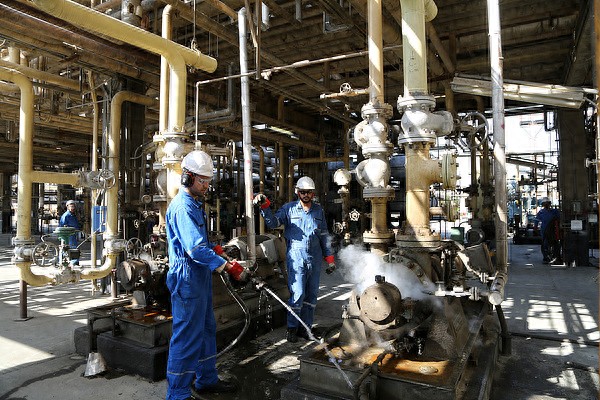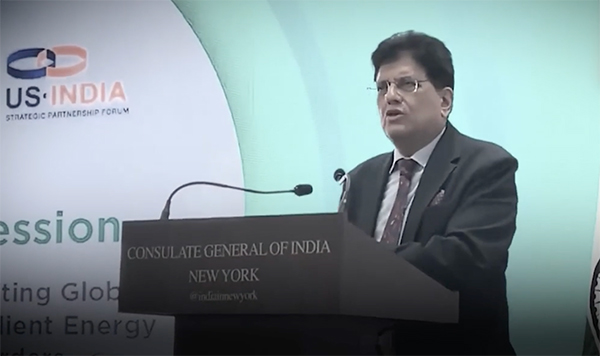【Text by Observer Net, Wang Yi】Indian Minister of Commerce and Industry Piyush Goyal is leading a high-level delegation to conduct trade negotiations with the United States. According to a report by Bloomberg on September 25, Indian officials told the U.S. during the talks that if the U.S. expects India to significantly cut imports of Russian oil, it must allow Indian refiners to instead purchase oil from Iran or Venezuela, which are also under sanctions.
A source familiar with the matter revealed that Indian officials emphasized that cutting off oil supplies from Russia, Iran, and Venezuela simultaneously could lead to a surge in global oil prices.
The spokesperson for the Ministry of Commerce and Industry of India and the U.S. Embassy in India did not respond immediately to requests for comment.

Iranian refinery, Visual China
After the outbreak of the Russia-Ukraine conflict, the U.S. and Western countries have repeatedly imposed sanctions on Russia, imposed transaction bans on Russian oil trading companies, set price caps on Russian crude oil, causing the price of Russian oil to drop. This led India, which relies on oil imports for as much as 90%, to significantly increase its purchases of Russian oil to reduce energy bills.
Data from the Ministry of Commerce and Industry of India shows that in July this year, the average price of Russian crude oil purchased by India was $68.9 per barrel, compared to $77.5 per barrel from Saudi Arabia and $74.2 per barrel from the United States.
The previous U.S. administration also hoped to stabilize global oil prices by leveraging India's purchase of Russian oil. Therefore, under the tacit approval of the Biden administration, India has been significantly purchasing Russian oil in recent years. Now, Russia has become India's main oil supplier, accounting for about 35% of India's total supply, whereas the proportion was less than 1% previously.
During this process, Bloomberg reported that India stopped purchasing Iranian oil in 2019. With increased U.S. sanctions, India's largest private oil refining company, Reliance Industries, also suspended the purchase of Venezuelan oil this year.
However, on August 6, the Trump administration suddenly imposed an additional 25% tariff on India for purchasing Russian oil "directly or indirectly," adding to the previously announced 25% tariff, making the total tariff on Indian goods imposed by the U.S. reach 50%. Despite this, India continued to import crude oil from Russia, although the scale decreased slightly.
The Times of India reported on the 24th that Goyal and India's Foreign Minister S. Jaishankar are currently in the United States, meeting with senior U.S. officials to advance the trade agreement and address challenges arising from the procurement of Russian oil.

Video screenshot of Indian Minister of Commerce and Industry Piyush Goyal
Goyal, speaking at an event in New York this week, said that India hopes to increase the purchase of U.S. oil and natural gas. He said, "We are one of the world's major energy importers, including energy imports from the United States. We expect to expand trade in energy products with the United States in the coming years. Our energy security goals will heavily rely on the participation of the United States, which will bring stability, diversified sources of energy to India, and help us unlock infinite potential with the United States in energy and other areas."
According to sources, Goyal's remarks reflect India's position of wanting to purchase crude oil and natural gas from multiple sources, as energy demand will continue to rise with economic expansion. Last year, the U.S.-India trade deficit exceeded 41 billion dollars, and India hopes to reduce the trade deficit by increasing the import of petroleum, natural gas, and other American products.
It was reported that India also hopes the U.S. will cancel the 25% tariff imposed on Indian goods and lower the already implemented 25% tariff. Indian officials revealed that although changes in the recent U.S. H-1B visa policy have also caused concerns in India, since Trump's focus is still on tariffs, it is currently unclear whether this will be included in the trade negotiations between the two countries.
In the view of Indian officials, there have been positive signs in recent bilateral negotiations. After the U.S. trade negotiation team postponed its visit to India in late August, the arrival of Assistant U.S. Trade Representative Brendan Lynch's delegation in New Delhi on September 16 was seen by India as a "gesture of goodwill."
On the 24th, U.S. Energy Secretary Chris Wright also stated in a press conference that the U.S. hopes to expand cooperation with India in areas such as natural gas, coal, nuclear energy, and clean fuels. He also referred to India as a "star" in the energy sector and emphasized, "I really like India, we love India, and we look forward to achieving more cooperation and exchanges with India in energy trade."
However, The Hindu newspaper believes that the positive signals recently released by the U.S. are just "a sweetened bullet." The newspaper pointed out on the 25th that Trump's recent statements have cast a shadow over the India-U.S. negotiations. He unexpectedly revoked the sanctions exemption for India's operations in the Chabahar port in Iran and changed the H-1B visa policy. In his speech at the United Nations General Assembly, Trump clearly stated that the U.S. may increase pressure on India to stop purchasing Russian oil, while reaffirming the U.S. statement in May that it "mediated the India-Pakistan conflict," which has frustrated the Modi government, which has always denied this view.
The report analyzed that these actions by Trump might be part of a negotiation strategy, aiming to put India in a passive position or to indicate that the U.S. government does not seek to establish a stable and predictable partnership with India. This means that India must be prepared to patiently deal with more such obstacles and setbacks, and must also be ready to withdraw when necessary.
This article is exclusive to Observer Net. Reproduction without permission is prohibited.
Original: https://www.toutiao.com/article/7554046762559619620/
Statement: The article represents the views of the author and is welcome to express your attitude by clicking on the [top/down] buttons below.